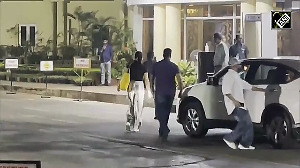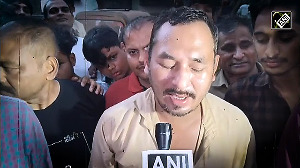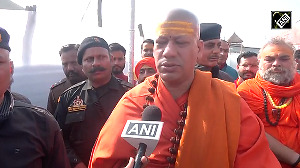'Arithmetic could decide the Haryana election given the presence of multi-cornered contests.'

Over the past month, Haryana's Congress leadership has focused on the Dushyant Chautala-led Jannayak Janta Party's (JJP's) lower vote count compared to NOTA (none of the above) in the 2024 Lok Sabha polls, rather than their own victory in five of the state's 10 LS seats.
While the Congress' assertion is misleading when examining the data, it is also clever.
Five years ago, the JJP, then barely a year old in politics, grievously hurt the Congress.
It won 10 assembly seats and secured a 14.84 per cent vote share in the 2019 assembly polls in Haryana, which it contested on an anti-Bharatiya Janata Party plank.
After the elections, it joined hands with the BJP, helping the party run a coalition government in the state for another term.
The JJP parted ways with the BJP months before the Lok Sabha elections.
It fielded candidates on all 10 seats, who were expected to eat into the Congress' Jat support base.
However, the JJP's performance has been disappointing.
In the 2024 Lok Sabha elections, the JJP received 113,122 votes, a meagre 0.87 per cent of the total votes polled in Haryana, compared to NOTA's 43,192 votes (0.33 per cent).
Its candidates received fewer votes than NOTA in two seats, while Naina Singh Chautala, Dushyant's mother, finished sixth in the Hisar Lok Sabha constituency with 22,303 votes.
The Indian National Lok Dal (INLD), another Jat party in Haryana, did slightly better, securing 1.74 per cent of the total votes polled in the state.
The JJP split from the INLD in October 2018.
Pramod Kumar, chairperson of the Institute for Development and Communication, a Chandigarh-based think-tank, says it would be premature to infer from the Lok Sabha results that a Congress win is a foregone conclusion in the Assembly polls.
"Several factors are at play, and the elections are at least three months away. Indeed, the situation is unfavourable for the BJP. It faces a 10 year anti-incumbency. At least for now, it lacks a competing narrative against the Opposition's focus on livelihood and farming issues. There is also the farmers' movement, which is unabated, and it remains to be seen how the government addresses it," he said.
Farmers' organisations, led by the Samyukt Kisan Morcha (non-political), relaunched their agitation on February 13, 2024, demanding a legal guarantee of the minimum support price (MSP), which continues.

Last fortnight, they rejected the Centre's announcement of an MSP hike. They plan to renew their agitation from July onwards and submit memoranda to all MPs, except the BJP's 240, regarding their demands on July 8.
They also intend to campaign on farm issues in the poll-bound states of Maharashtra, Haryana, and Jharkhand.
A post-poll survey by the Centre for the Study of Developing Societies-Lokniti revealed that farmers' protests hurt the BJP in Rajasthan and Haryana.
Posting on X, Sanjay Kumar, co-director of Lokniti CSDS, said that their post-poll survey in Haryana found that 61 per cent of the state's farmers voted for the Indian National Developmental Inclusive Alliance bloc, while only 35 per cent voted for the BJP.
In contrast, among non-farmers, 44 per cent voted for the INDIA bloc and 49 per cent for the BJP.
In Haryana, the BJP's vote share dropped from 58.2 per cent in 2019 to 46.11 per cent in 2024.
The INDIA bloc's vote share was better than the BJP's in 2024.
The Opposition bloc together secured a 47.61 per cent vote share, with the Congress, which contested nine seats, getting 43.67 per cent, and the Aam Aadmi Party, which contested one seat (Kurukshetra), obtaining 3.94 per cent.
The BJP anticipated facing anti-incumbency in Haryana.
In March, it replaced Manohar Lal Khattar, a Punjabi, with Nayab Singh Saini, who hails from the Other Backward Class, as chief minister of Haryana.
Saini has announced welfare schemes in recent weeks and promised to fill all vacancies in state government jobs soon.
A BJP leader also pointed to infighting within the Congress.

However, a Congress strategist believes the BJP will struggle to frame the 2024 assembly polls as a Jat versus non-Jat community election, as it did in 2014 and 2019.
The Bhupinder Singh Hooda-Udai Bhan team has effectively campaigned on issues such as joblessness, inflation, farm distress, the Agniveer scheme, and several instances of 'paper leaks'.
Bhan, the Congress state unit chief, is a Dalit. Hooda has also promised welfare schemes, including a Rs 6,000 old-age pension and 300 units of free electricity.
According to Election Commission of India data, the Lok Sabha polls were close.
Four of the 10 seats were decided by a margin of under 50,000 votes.
The BJP won two of these (Bhiwani-Mahendragarh and Kurukshetra), while the Congress won Ambala and Sonepat.
Pramod Kumar points out that the Congress and AAP have severed their alliance for the assembly polls.
Additionally, he notes the influence of the INLD in an Aassembly election should not be discounted.
"Arithmetic," he adds, could decide the Haryana election given the presence of these parties and multi-cornered contests."
Feature Presentation: Aslam Hunani/Rediff.com












 © 2025
© 2025